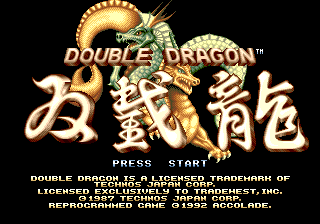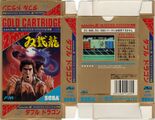Difference between revisions of "Double Dragon"
From Sega Retro
| Line 38: | Line 38: | ||
==Physical Scans== | ==Physical Scans== | ||
| − | |||
| − | |||
| − | |||
===Mega Drive=== | ===Mega Drive=== | ||
{{Scanbox | {{Scanbox | ||
| Line 50: | Line 47: | ||
===Master System=== | ===Master System=== | ||
| + | {{ratings | ||
| + | | icon=SMS | ||
| + | | cvg=76 | ||
| + | | cvg_source={{num|86}} | ||
| + | }} | ||
{{scanbox | {{scanbox | ||
| console=Master System | | console=Master System | ||
Revision as of 17:12, 10 March 2012
- For the 1993 Game Gear game by Virgin Interactive, see Double Dragon (Game Gear).
| Double Dragon | |||||
|---|---|---|---|---|---|
| System(s): Sega Mega Drive, Sega Master System | |||||
| Publisher: Ballistic Sega | |||||
| Developer: Technos; Accolade Sega | |||||
| Genre: Action | |||||
| Number of players: 1-2 | |||||
|
Double Dragon (ダブルドラゴン) is a 1987 arcade beat-'em-up by Technos. It was ported to a variety of consoles; Accolade brought it to the Sega Mega Drive in 1993 and Sega to the Sega Master System in 1988. Accolade's version was licensed by Sega, despite the ROM header saying otherwise.
Contents
Gameplay
The game takes place over four levels ending at the final boss, Willy. The first player is Billy and the second controls Jimmy. The characters are able to punch (![]() ), kick (
), kick (![]() ), and perform a variety of moves by using combinations of the available buttons. The Mega Drive version has a jump button (
), and perform a variety of moves by using combinations of the available buttons. The Mega Drive version has a jump button (![]() ) while the Master System version only allows jumping through button combinations. Weapons found throughout the level can be picked up and used against opponents. Weapons that can be used include bats, whips, barrels (not in Master System version), boxes, rocks, knifes, and sticks of dynamite.
) while the Master System version only allows jumping through button combinations. Weapons found throughout the level can be picked up and used against opponents. Weapons that can be used include bats, whips, barrels (not in Master System version), boxes, rocks, knifes, and sticks of dynamite.
Levels
Levels include a slum, a industrial area, a forest, and the boss's lair. Level hazards include pitfalls, water, conveyor belts, poles which come out of walls (not in the Mega Drive version), and spikes.
Version Differences
The Mega Drive port is a straight port of the arcade with slight differences in graphics and sound. The enemies also easily mimic the players up and down movement, which can lead to some annoyance.
The Master System version has slightly different controls due to the controller only having two buttons. Some parts of the levels are designed differently and extended. The mohawk Abobo is missing in this version. Unlimited continues are available up until the final stage (although unlimited continues can be attained in the final stage through a cheat).
Physical Scans
Mega Drive
Master System
| Sega Retro Average | ||||||||||||||||||||||||||||||||||||||||||||||||||||||||||||||||||||||||||
|---|---|---|---|---|---|---|---|---|---|---|---|---|---|---|---|---|---|---|---|---|---|---|---|---|---|---|---|---|---|---|---|---|---|---|---|---|---|---|---|---|---|---|---|---|---|---|---|---|---|---|---|---|---|---|---|---|---|---|---|---|---|---|---|---|---|---|---|---|---|---|---|---|---|---|
|
| 75 | |
|---|---|
| Based on 14 reviews | |
| Double Dragon games for Sega systems | |
|---|---|
| Double Dragon (1988) | |
| Double Dragon II: The Revenge (1991) | Double Dragon (1992) | Double Dragon 3: The Rosetta Stone (1992/1993) | Battletoads/Double Dragon: The Ultimate Team (1993) | Double Dragon V: The Shadow Falls (1994) | |
| Double Dragon (1993) | |
- ↑ Complete Guide to Consoles, "" (UK; 1989-10-16), page 54
- ↑ Complete Guide to Consoles, "Volume IV" (UK; 1990-11-xx), page 95
- ↑ The Complete Guide to Sega, "" (UK; 1991-05-xx), page 55
- ↑ Computer Action, "Juli/August 89" (DK; 1989-0x-xx), page 34
- ↑ Console XS, "June/July 1992" (UK; 1992-04-23), page 139
- ↑ Computer & Video Games, "December 1988" (UK; 1988-11-xx), page 175
- ↑ The Games Machine, "June 1989" (UK; 1989-05-18), page 74
- ↑ Mean Machines Sega, "October 1992" (UK; 1992-09-xx), page 133
- ↑ Player One, "Février 1991" (FR; 1991-xx-xx), page 24
- ↑ Sega Power, "October 1991" (UK; 1991-09-05), page 41
- ↑ Sega Power, "October 1991" (UK; 1991-09-05), page 56
- ↑ Sega Pro, "December 1991" (UK; 1991-11-21), page 47
- ↑ Sega Pro, "April 1993" (UK; 1993-03-11), page 70
- ↑ Tilt, "Mars 1989" (FR; 1989-0x-xx), page 71








